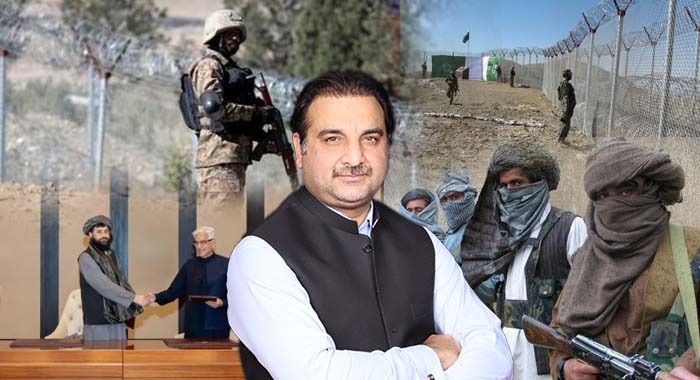( Irfan Khan )
The recent Istanbul negotiations between Pakistan and Afghanistan have once again reached a dead end largely due to the obstinacy of the Afghan government. This diplomatic impasse not only underscores Kabul’s unwillingness to cooperate on vital security matters but also raises serious concerns about the future of regional peace and Pakistan-Afghanistan relations.
These talks were not the first attempt to break the deadlock. Meetings were previously held in Kabul and Moscow, making this the sixth round of dialogue aimed at establishing a framework for regional stability. Yet, despite repeated efforts, no substantial progress has been achieved. Pakistan’s stance remains clear and consistent: any terrorist group or militant organization operating from Afghan soil against Pakistan will face a decisive response. Pakistan reserves the right to defend its people and its borders a right guaranteed under international law.
Reports from the United Nations Security Council, the South Asia Terrorism Portal, and other international monitoring institutions confirm a disturbing trend: since the Taliban’s return to power in August 2021, cross-border attacks on Pakistan have surged by nearly 300 to 400 percent. This alarming escalation illustrates that the so-called Islamic Emirate of Afghanistan has failed or refused to prevent its territory from being used as a base for attacks against its neighbours. The question, therefore, arises: is the Afghan government too weak to act, or is it following someone else’s agenda?
Afghanistan’s repeated blame on Pakistan for its internal failures is not only misplaced but hypocritical. There has not been a single verifiable incident of aggression initiated by Pakistan. On the contrary, Pakistan’s limited military actions have been strictly retaliatory, taken only when provoked by cross-border attacks. The recent meetings in Moscow, attended by Pakistan, China, Russia, Iran, and Afghanistan, were particularly telling. There, Afghan Foreign Minister Amir Khan Muttaqi was explicitly told by all participating states to dismantle the terrorist networks operating on Afghan soil. These groups, they emphasized, are not only a danger to Pakistan but also to Iran, China, and Russia.
Despite such warnings, Kabul continues to play a dangerous double game. Just days before the Moscow meeting, Amir Muttaqi visited India, where he reportedly discussed new infrastructure projects — including a dam to be built with Indian assistance. This move reflects a troubling alignment: Afghanistan seems increasingly willing to act as a proxy for India’s strategic ambitions in the region. Such choices deepen mistrust and threaten to further isolate Kabul diplomatically.
The internal disunity within the Taliban regime has only compounded the situation. Sharp divisions between the Kandahari faction and the Haqqani Network have become apparent. Foreign Minister Muttaqi’s isolation in the negotiation process without the active support of figures such as Defence Minister Mullah Yaqub reveals a fractured leadership incapable of presenting a unified policy. This internal discord weakens the Islamic Emirate’s credibility in international diplomacy and undermines its commitments to regional stability.
Turkey and Qatar have both attempted to mediate, yet the Islamic Emirate’s rigidity has made progress nearly impossible. Pakistan’s demands are straightforward: remove the militant groups operating from Afghan territory or at least restrain them from launching attacks against Pakistan. If Kabul cannot fulfil even this minimal responsibility, it only exposes the weakness of its governance. The Taliban’s fear of internal backlash from these groups further indicates how fragile their hold on power truly is.
For decades, Pakistan has stood by Afghanistan offering refuge, education, and economic assistance to millions of Afghans during the most turbulent periods of their history. Yet today, Kabul accuses Islamabad of not respecting Afghan sovereignty. This accusation is both ironic and baseless. Before making such claims, Afghanistan must first decide when it actually considers itself “free.” From the reign of Ghazi Amanullah Khan in 1919 to the Taliban’s return in 2021, every regime change in Kabul has been celebrated as “independence.” If a country redefines its freedom with each new regime, can it truly claim sovereignty?
The reality is that more than 80 percent of Afghans living abroad in Europe and elsewhere do not even recognize the current flag of the Islamic Emirate. Their refusal to accept the regime’s symbols reflects a deep disconnect between the rulers in Kabul and the Afghan people themselves.
Today, Pakistan is not standing alone. Both China and Iran have publicly declared their support for Pakistan’s stance against terrorism. This emerging regional alignment shows that the threat emanating from Afghanistan is no longer a bilateral issue it is a shared concern for all neighbouring states. It is now the test of the Islamic Emirate: will it continue to protect and shelter terrorists while aligning itself with India’s interests, or will it stand with the countries that seek genuine peace and stability in the region?
Meanwhile, Pakistan faces internal distractions of its own. In Khyber Pakhtunkhwa, the provincial government led by Sohail Afridi has prioritized political rallies over governance. It is ironic that those who have governed the province for over a decade continue to behave like opposition agitators. Since 2014, their politics have revolved around protests and slogans rather than policymaking and development. After eleven years in power, they have little to show no major universities, no significant hospitals, and no transformative projects beyond the controversial Bus Rapid Transit scheme that ballooned to Rs175 billion.
Their politics thrive on confrontation and victimhood rather than results. When asked about corruption, they blame the bureaucracy. When questioned on governance, they deflect responsibility. When challenged on security, they hide behind institutions. This persistent evasion of accountability is the hallmark of their politics.
Pakistan today stands at a critical juncture. On one front, it faces external threats from across the border; on the other, it struggles with internal political immaturity. Both must be addressed with clarity, unity, and resolve. The time for excuses in Kabul and in Peshawar alike is long over.





